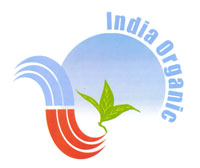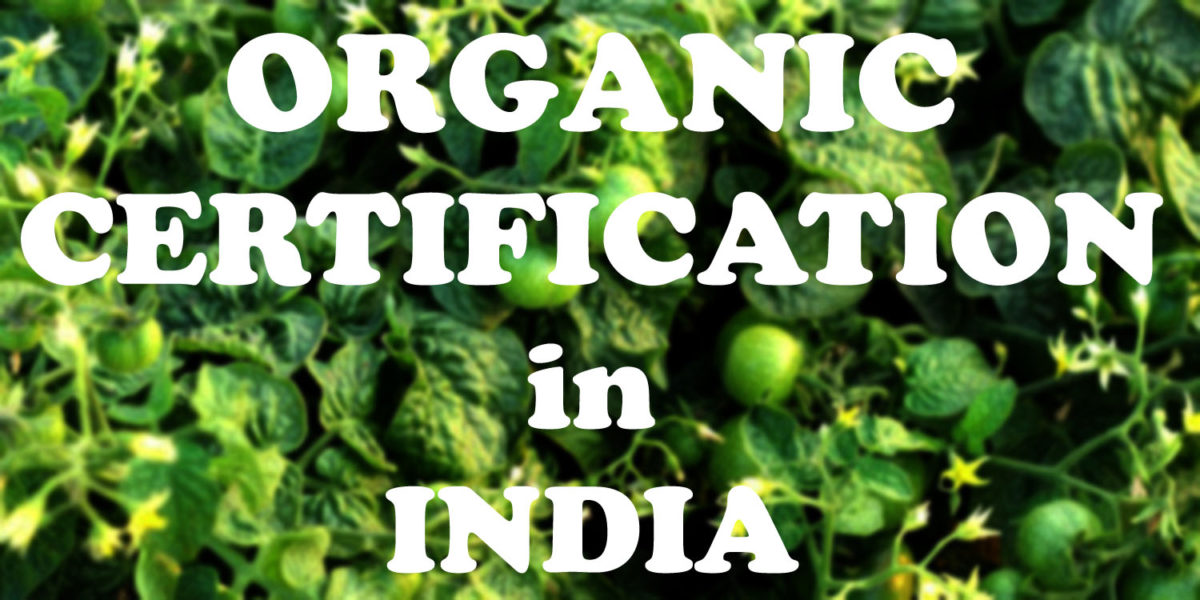There has been a steadily growing interest in Organic farming in recent times. Large scale farmers and groups of small farmers who have taken up organic farming are now getting organic certification for their produce, which enables customer to be assured of buying actual organic products and enables the farmer to get a premium on his returns. In India NPOP (National Program for Organic Production) and its regulatory body APEDA (Agricultural and processed food products export development authority) have laid down the guidelines for organic certification and all products that is organic certified displays the ‘India Organic’ logo for customer to easily identify certified products. This post touches upon the process of organic certification in India.

In 2006, India’s organic certification process under NPOP has been granted equivalence with European Union. It has also been recognized for conformity assessment by USDA’s NOP.
Principal of Standards
The organic certification process in India follows a set of standard guiding principals laid down by National Program for Organic Production (NPOP). They are as follows.
- Conversion of land for Organic Farming must be done.
- All inputs to the farm should be natural.
- No Genetically Modified inputs or Irradiation technology should be used.
- Integrity of all processes (physical, biological, mechanical) must be maintained at all times.
- No contamination from nearby farms or other means must be present.
- Sustainable practices must be followed in the farm.
Process of Organic Certification in India
Though organic certification can be obtained for all types of agricultural produce including processed food and food served in restaurants, in this post we’ll focus on only agricultural produce. Large scale farmers or small size land holder growers groups (minimum of 25 and maximum of 500 farmers having lands in the same geographical area) can apply for Organic certification of their produce. The point to note here is that the land is not certified as organic. Rather the produce from it is certified.
APEDA offers an internet based e-service called Tracenet to collect, record and report data on organic certification and thus facilitating the process of organic certification. It is also used to trace any organic produce all the way to the farm from anywhere in the supply chain.
Organic certification process is carried out by accredited bodies under NPOP. Here is the process of Organic certification in a nut shell.
- Receipt of application by any accredited organic certification body from farmer(s).
- The certification body provides standards and operational documents to farmer(s).
- There is an agreement of roles and commitments between the farmer(s) and the body.
- Demand of fees by accredited body.
- Document audit.
- Regular Field inspection by internal quality system manager and external inspector and documentation of the same.
- Compliance verification through inspection and audits.
- Preparation of reports by the field inspector.
- Review of report by a reviewing body.
- Decisions on certification.
The field inspection is one of the most important process step in Organic certification in India. Here is a summary of the inspection methods.
- Visit of external inspector to fields and facilities.
- Review of records and accounts.
- Calculation of input and output norms and preparation of production estimate from a farm.
- Assessment of production system
- Interview with responsible person(s).
- Risk assessment from neighboring farms.
- Inspection of use of any GM products.
- Inspection of use of off-farm inputs.
- Analysis of residue tests by certified laboratories for pesticides, heavy metals if required.
- Inspection of sustainable practices.
- Inspection and study of entire production unit.
Organic certificate for any produce is valid for 3 years only. It must be renewed after expiry of 3 years.
Wild Harvest Organic Certification
Wild harvests also can be certified as organic and no conversion period is required for wild lands. Here are a few pointers on certification of wild harvests.
- Only products and not the forest is certified.
- Applies to natural forests only.
- Collection not to exceed sustainable yield of any species and it must not threaten local ecosystem. Around 40% produce should be left in the forest itself.
- The produce must be derived from a stable and sustainable growing environment.
- Produce collection activities should positively contribute to maintenance of natural heritage.
Time period and expenditure for Organic Certification in India
The typical expenditure on getting organic certification for Individual farmers varied within 25,000/- INR to 40,000/- INR, while for farmer groups it varies between 40,000/- INR to 1,00,000/- INR.
| Type of agricultural unit | Typical time period for organic certification |
|---|---|
| Farm | 24 months |
| Fruit Orchards | 36 months |
| Dairy unit on certified land | 90 days |
| Food Processing units | 1 day |
| Unused land | Typically takes the same time as a farm or fruit orchard. But if the land happens to be in remote area then the time can be relaxed by 12 months at best. |
The entire process of Organic certification involves a lot of record keeping and process steps. It may look daunting, but the organic certification adds a lot of value to the produce as the certification is accepted not only in India, but also in North America and EU. Customers are ready to pay a premium if they are assured what they are buying is actually organic and not fraudulent. The India Organic logo gives that assurance to the end customer.



I have heard from my mom that when she was a child the farming is done without the chemical so that they can eat Organic Processed food i.e Chemical free food. But now this doesn’t happen now a days we unable to found organic food. This article demonstrates the organic processed food in India. Nice article.
Hi I am a individual apple orchard ist from Himachal Pradesh practicing organic farming from last one year..can a individual orchard farm get certification ..and if so what is the minimum land size required
Yes it can get certification. I dont have idea about the land size for an orchard, but please get in touch with Regional center for Oragnic farming (RCOF) center nearby.
Hi, we started growing millets and other grains 3 months back and everything is organic, but it looks like it takes time to get certified, I want my business to sell only organic but to do that it seems like it takes time. What do I do with the produce now, which is organic but not certified.
Thats the situation most organic farmers face in India. I guess you can sell it locally and convince the buyers by engaging with them.
Hey very nice blog!
Farmers are already burdened by raising cost and limited resources. How can they afford to pay for the certification cost? Government bodies should be formed to provide these services for free to encourage farmers to adopt organic farming. It is disappointing to see such retarded implementation by India.
The certification is not really too high as it is shared between farmers. Its the certification process which is more complicated. Many NGO’s are helping farmers with this and also with the fees in some cases.
I have a plan to built a vegetable organic farm. can suggest the process of beginning stage. I belong from a farmer family I have vast idea about vegetable farming, but want to gather organic farming process in a scientific way.
It will be difficult to put it down here as its a vast topic. All I can say now is start by sanitizing your soil by different methods such as solarization and use of trichoderma. Then keep working on building and maintaining soil. Keep your soil healthy and alive. Look up some books on organic farming for more information.
Dear Mr. Prabal,
This is a nice article and gave me an idea of Organic Certification. So here’s my question. I am planning on starting organic farming in my parent’s farmland that has not been used for farming in the past 20-30 years. Before that, there was some active farming done. So should I get the certification before starting any work in the farm or can I start the work and parallelly work on getting certification for the produce, since your article says that the certification is only for the produce itself and not the land per se?
Also, do you have your course online?
Appreciate your time for answering my question,
Regards,
Hema
Hi Hema,
Organic conversion of land takes about 2 to 3 years typically depending on how the land has been used earlier. Yours may take less time as it has not been used for a long time. So start farming and in parallel apply for the certification.
I font have online course yet. But a book and online course is planned for future.
Hello ,
Is it possible to start individual firm and plz tell me the requirements for it.
I m a farmer practicising organic farming for the past three years how to get organic certification old reply.
I want to be an Entrepreneur to help Farmers to get their produce certified as it seems to be a daunting task for Farmer community. Due to this lengthy arduous process farmer as well as Common man miss out the benefits in large scale . I wanted to understand the mechanism involved to start that service. Can you please give some suggestions?
how food products get organic certification
Its a much simpler and quicker process. Please check apeda website for details